When someone says root canal, people around usually clench their teeth in nervousness. But why do root canals scare people so much? Most individuals think that a root canal is a very painful treatment. But with the advancement of dentistry and dental technologies, root canal procedures have considerably changed.
I wrote this article to make things clear about any types of myths surrounding root canal treatments and help people know the real facts and what to expect if they ever need one.
1 – A root canal treatment is a painful procedure
 False. A root canal does not cause pain. In fact, root canals are performed to relieve pain caused by inflammation of the pulp chamber (where the nerve is located) or a dental infection. The belief that a root canal hurts goes way back in the past. With modern anesthesia, this procedure is no more painful than doing a filling.
False. A root canal does not cause pain. In fact, root canals are performed to relieve pain caused by inflammation of the pulp chamber (where the nerve is located) or a dental infection. The belief that a root canal hurts goes way back in the past. With modern anesthesia, this procedure is no more painful than doing a filling.
If there is severe dental infection, anesthesia may be more difficult to achieve and your dentist may decide to prescribe you antibiotics prior to the root canal treatment. If a root canal seems very complicated to achieve, your dentist may refer you to an endodontist, who is a colleague dentist that specializes in root canals.
2 – A root canal is a costly treatment
 True. Although a root canal is a pricey treatment, it does save a tooth and helps a person keep it and use it to maintain normal chewing functions. Having a root canal and a dental crown remains less expensive than extracting a tooth and then replacing it with a bridge or a dental implant.
True. Although a root canal is a pricey treatment, it does save a tooth and helps a person keep it and use it to maintain normal chewing functions. Having a root canal and a dental crown remains less expensive than extracting a tooth and then replacing it with a bridge or a dental implant.
Costs vary on how many canals a tooth has, whether it’s the first time the root canal is achieved or retreatment, or on who performs the root canal (general dentist or specialist).
3 – A root canal removes the pain immediately after the procedure
 False. After a root canal, the patient will feel significant improvement. However, it is normal for the tooth to be sensitive the first few days after treatment and the use of pain killers can help. Mild pain can be followed, especially while chewing, and it can last a few weeks. The pain should disappear completely however after that time.
False. After a root canal, the patient will feel significant improvement. However, it is normal for the tooth to be sensitive the first few days after treatment and the use of pain killers can help. Mild pain can be followed, especially while chewing, and it can last a few weeks. The pain should disappear completely however after that time.
Is it possible not to feel any pain at all after a root canal procedure? Yes it’s possible, and this depends on how complicated was the treatment and on whether or not the tooth was infected before treatment.
4 – Root canals do not work
 False. Although nothing can replace your tooth completely, a root canal that is done well, with an appropriate filling or crown, has a very high success rate. In about 85% of cases, treatments can last a lifetime.
False. Although nothing can replace your tooth completely, a root canal that is done well, with an appropriate filling or crown, has a very high success rate. In about 85% of cases, treatments can last a lifetime.
If a tooth becomes infected again years after root canal has been done, it can often be retreated. However, in certain situations, such as tooth fracture, root decay that is too deep, or severe bone loss around the tooth, your dentist may have no choice but to extract the affected tooth.
5 – It is normal that a tooth remains a little sensitive after a root canal
 False. It is not normal to experience persistent pain that could last a few months after root canal treatment has been performed on a tooth. Among the causes of pain that remains are hidden canals that were not cleaned during the procedure, or the tooth itself being broken all the way to the root.
False. It is not normal to experience persistent pain that could last a few months after root canal treatment has been performed on a tooth. Among the causes of pain that remains are hidden canals that were not cleaned during the procedure, or the tooth itself being broken all the way to the root.
In these rare cases of persistent pain, patients could be referred to consult an endodontist, who is a specialist for root canals, to get a diagnosis and have the tooth treated. In cases where the root of a tooth is fractured, no treatment can be done to save that tooth and the only thing to do is to have it extracted.
6 – A root canal “kills” the tooth
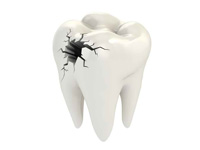 False. A root canal cleans and disinfects the inside of the tooth to allow it to heal; it does not kill a tooth. The nerves and the blood vessels located in the pulp chamber server for the development of a tooth when a person is a child or a teenager.
False. A root canal cleans and disinfects the inside of the tooth to allow it to heal; it does not kill a tooth. The nerves and the blood vessels located in the pulp chamber server for the development of a tooth when a person is a child or a teenager.
Later in life, the nerve’s function is to cause pain when something is wrong with the tooth, whether it’s decay, infection, inflammation or trauma. Pain is therefore a defence mechanism that alarms a person to seek help.
7 – It is necessary to take powerful painkillers after a root canal
 More or less true. The pain experienced after a root canal is usually caused by inflammation around the tooth and it only lasts for a temporary amount of time. This inflammation is often best treated with common pain killers like anti-inflammatory drugs such as ibuprofen (Advil, Motrin), or with acetamynophen (Tylenol).
More or less true. The pain experienced after a root canal is usually caused by inflammation around the tooth and it only lasts for a temporary amount of time. This inflammation is often best treated with common pain killers like anti-inflammatory drugs such as ibuprofen (Advil, Motrin), or with acetamynophen (Tylenol).
In case of more severe pain that persists months after the root canal procedure has been done, it is recommended to consult your dentist or your endodontist search for possible complications.
8 – Teeth undergoing root canal treatment often need a crown
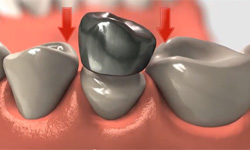 True. Usually teeth that need root canal treatment have very big cavities or big fillings. A tooth with a big filling is more at risk to be fractured. For this reason, your dentist may recommend the placement of a post and a crown after the root canal procedure.
True. Usually teeth that need root canal treatment have very big cavities or big fillings. A tooth with a big filling is more at risk to be fractured. For this reason, your dentist may recommend the placement of a post and a crown after the root canal procedure.
Some dentists place a post and a filling on a tooth right after the root canal has been done. Although the post gives more strength to the tooth than placing just a filling alone, a crown is still recommended to make the tooth stronger.
9 – Root canal treatment is a lengthy process that requires several appointments
 False. Today, root canal treatment may take between one and two hours if there are no complications. The number of appointments often depends on the condition of the tooth and the number of canals it has.
False. Today, root canal treatment may take between one and two hours if there are no complications. The number of appointments often depends on the condition of the tooth and the number of canals it has.
In cases where infection is severe, your dentist or endodontist may place a drug inside to help disinfect the interior of the roots, and then finish the root canal treatment a few days later. But if there is no infection or no complications, the procedure can be completed in one single appointment.
10 – A tooth with a root canal treatment that has failed should always be extracted
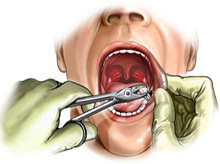 False. The success rate of root canals is about 85%. If a root canal has been done years ago and re-causes pain or infection, the tooth can often be retreated.
False. The success rate of root canals is about 85%. If a root canal has been done years ago and re-causes pain or infection, the tooth can often be retreated.
A retreatment is a procedure of redoing the root canal by re-cleaning the inside of the roots, disinfecting and obtruding each canal. Some teeth may require an apectomy instead, which is a microsurgery used to remove the tip of the root. Modern techniques of restatements and microsurgeries work well.
References
The information above should be used as a reference only. Any medical decision should not be taken before consulting a health care professional.
The masculine gender may have been more used in the article, but without prejudice, to make reading easier.
Category: articles
- 10 myths and facts about root canals
- 10 things you didn’t know about teeth
- 10 ways to crack or break your teeth
- 5 reasons why baby teeth are so important
- 5 things you didn’t know about wisdom teeth
- 5 ways to provide the best dental care for your children
- 6 reasons why flossing daily is so important
- 8 ways to stay kissable for Valentine’s Day
- Anaesthetics and sedation for oral treatments
- Bisphosphonates and oral health care
- Can good dental care save money?
- Cancer treatments and oral health
- Causes and consequences of tooth loss
- Dementia and tooth loss
- Dental avulsion: what to do when you have a knocked out tooth
- Diabetes and dental care
- Easter tips for healthy teeth
- Ebola virus disease
- Electric or regular, which toothbrush is better?
- Halloween, good and bad treats
- Heart disease and dental care
- How smoking affects dental and oral health
- How to have a beautiful smile?
- Invisible orthodontics
- Oral hygiene kit for travellers
- Precautions to take after dental fillings
- Pregnancy and dental care
- Sexual hormones – are women more susceptible to cavities?
- Smoking and gum disease
- Tips to overcome dental phobia and the fear of dentists

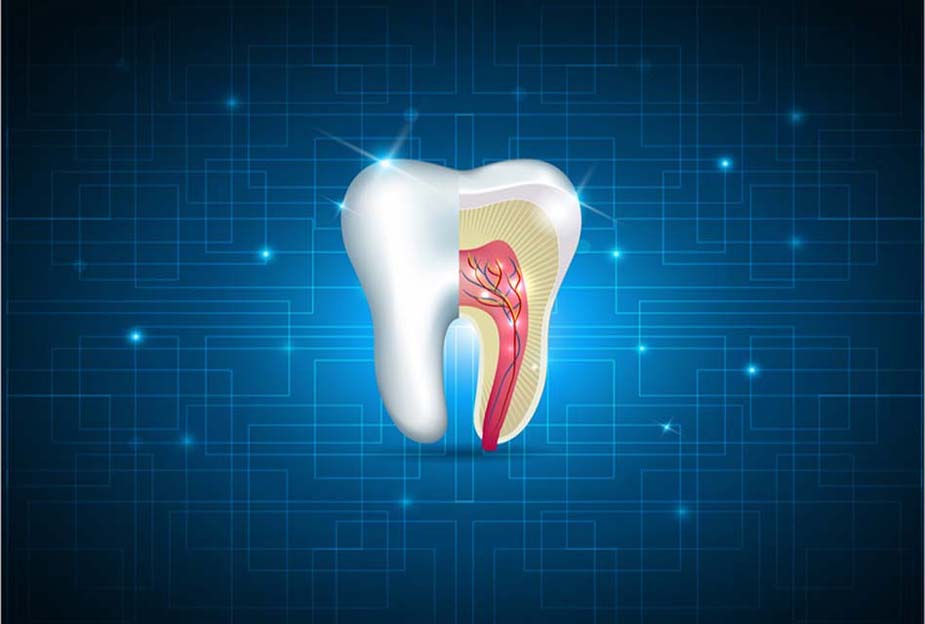
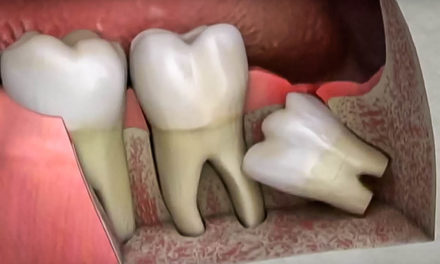
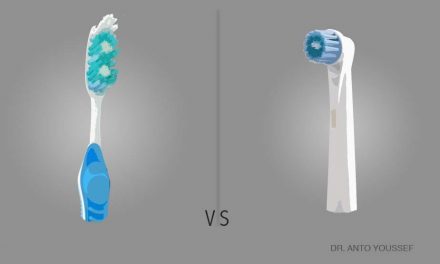


I dont understand this part >The nerves and the blood vessels located in the pulp chamber server for the development of a tooth when a person is a child or a teenager.<
What is server?
Im having pain still after I had root canal on an upper tooth & the pain goes to the back of the eye (eye located above the tooth) The 'specialist' that did the treatment doesnt want to know i.e any further consultation requires more ££££
Im based in the UK. BTW thanks for an informative website.
It’s “serve”, sorry.
It is unusual to have pain in the back of the eye following a root canal. Did you tell the root canal specialist? Maybe the source of the pain is some place else.